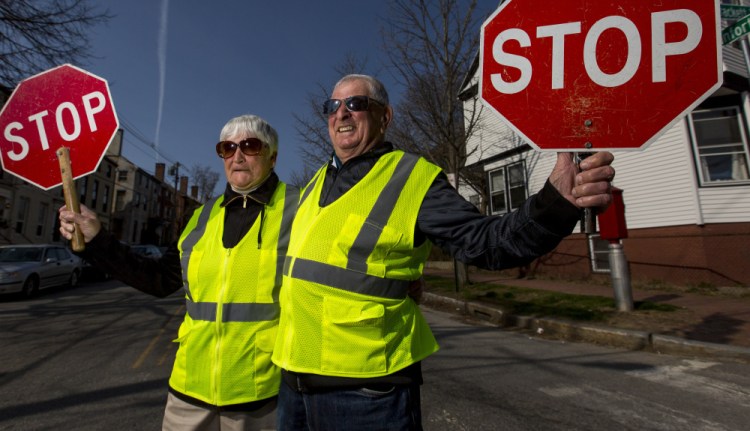Some of the most important jobs depend on the lowest-paid and least-heralded workers.
School crossing guards show up at busy intersections twice a day, in all kinds of weather. They help children walk safely to and from school and teach them lifelong skills about pedestrian safety. Most guards get paid just slightly above minimum wage.
Lou Alexander, 81, waits faithfully each school-day morning at the intersection of Brackett and Danforth streets in Portland’s West End for about a dozen children who pass by on their way to Reiche Elementary School.
After more than 20 years on the job, Alexander knows all of his regulars and many of their parents. “Good morning, everybody!” he greets a father with two boys, as he halts traffic. “Everybody ready for school?”
A father of four and grandfather of 15, Alexander often asks children how they did on their homework. He’s ready with a smile if a child seems down in the dumps, and he sometimes slips children a candy bar as they cross.
Alexander also keeps a sharp eye on cars, watching for those who roll through stop signs. “If I see something I need to call (the police) on,” he says, “I will.”
The number of elementary and middle school-age students in the United States who walk to school plummeted from 48 percent in 1969 to 13 percent in 2009. But the National Safe Routes to School program and its Maine affiliate are working to change that. Children benefit from the daily exercise, and school districts save money on bus transportation. Fewer buses and cars dropping off children also mean less pollution.
Crossing guards play a crucial role in helping students walk to school safely. Yet recruiting them can be difficult because of the limited hours, low pay and split shift. Some districts depend on parent volunteers or police officers to fill that role.
As Maine municipalities look for places to trim budgets, some have cut crossing guard positions. Two years ago, Augusta eliminated all 10 of its guards, despite strong protests from parents. The school department has since added back two positions, but one remains unfilled because no one applied for the job.
Portland has about 30 crossing guards stationed near the city’s elementary schools. The starting pay is $10.50 an hour for those with regular shifts, and a dollar more for floaters who go wherever they are needed.
“It can be a little challenging to fill openings, especially in the colder months,” said Kevin Ready, whose job as senior parking control officer includes overseeing Portland’s crossing guards. But Ready added that the city has a “solid core” of guards with long tenures, including retirees, stay-at-home parents and people recruited from vocational programs.
Alexander, the Reiche crossing guard, has worked hard his whole life, and he sees no reason to stop in his ninth decade. He grew up on Peaks Island, served as an Air Force mechanic for 22 years, then oversaw the servicing of planes at the Portland Jetport and worked for 10 years at Maine Medical Center. He also worked as a reserve officer in Cape Elizabeth, and he has volunteered 2,200 hours at Mercy Hospital.
In 1995, Alexander tried retiring, but not for long. That August, he answered an ad for a Portland crossing guard.
The person who returned the call reached his wife, Marion. Alexander recalls her response with a smile: “Get him out of the house, won’t you?”
For a decade, Alexander worked part of the school year as a “floater” and headed south in the winter with his wife. When the Scarborough couple tired of “the Florida thing” about 10 years ago, Lou Alexander was assigned a regular corner. Marion Alexander, 79, now works as a crossing guard a block away.
Lou Alexander likes knowing that he has a place to go every morning where people need him – and his doctor says that daily activity helps him stay healthy. When he and his wife finish their morning shift at about 8:20, they usually head to McDonald’s for coffee.
“Very rarely do we ever take a day off,” Lou Alexander said.
We are lucky to have dedicated people like the Alexanders watching over our children on the way to and from school.
This is a great time to encourage the children in your life to try walking or bicycling on their daily commute, if road conditions make that possible. May is Maine Walk & Bike to School Month, and May 4 is National Bike to School Day. Several schools around the state already are planning special events. Find listings at mainesaferoutes.org.
Shoshana Hoose is a freelance writer who walks and bicycles in Greater Portland and beyond. Contact her at shoshanahoose@gmail.com.
Send questions/comments to the editors.



Success. Please wait for the page to reload. If the page does not reload within 5 seconds, please refresh the page.
Enter your email and password to access comments.
Hi, to comment on stories you must . This profile is in addition to your subscription and website login.
Already have a commenting profile? .
Invalid username/password.
Please check your email to confirm and complete your registration.
Only subscribers are eligible to post comments. Please subscribe or login first for digital access. Here’s why.
Use the form below to reset your password. When you've submitted your account email, we will send an email with a reset code.